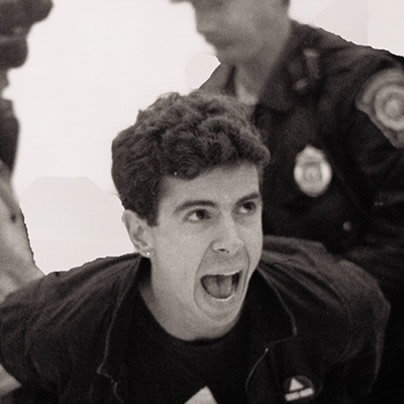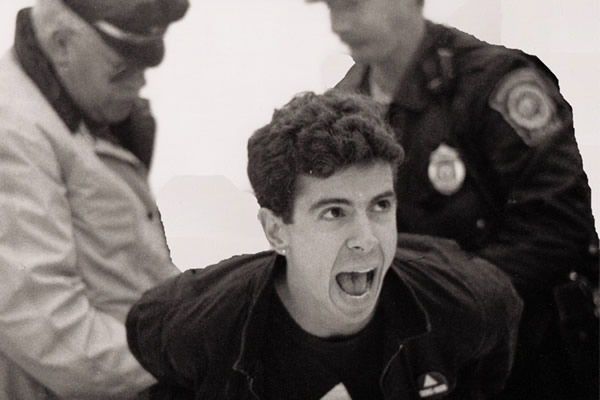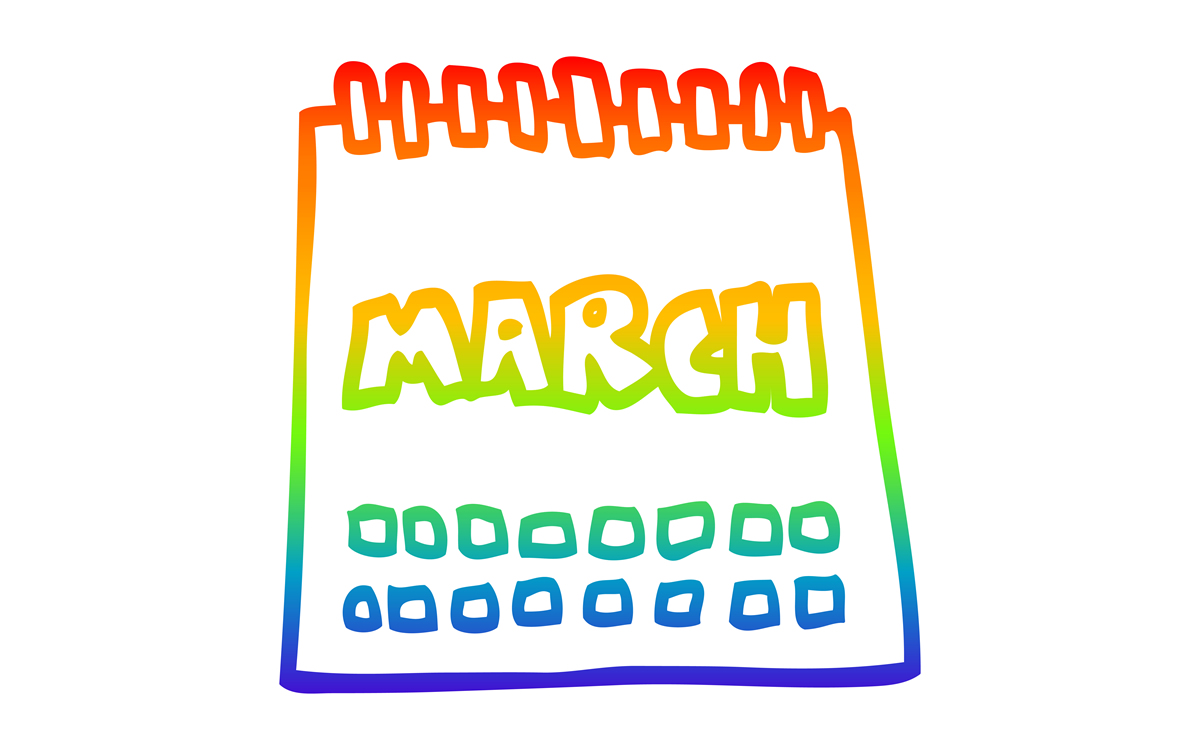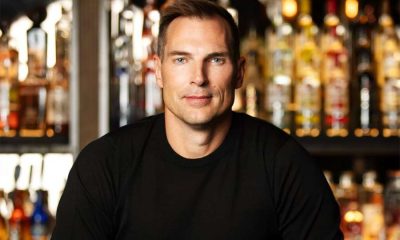Arts & Entertainment
I will survive
New documentary uses archival video footage to explore early days of AIDS


Peter Staley in a scene from ‘How to Survive a Plague.’ (photo by William Lucas Walker courtesy Sundance Selects)
As a journalist, openly gay writer David France is pretty fearless. The award-winning author has tackled such topics as the AIDS crisis, sexual abuse in the Catholic Church, the coming-out of former New Jersey governor James McGreevey and the brutal murder of Private Barry Winchell.
But, when he was poised to make the leap to documentary filmmaker, there was one thing that terrified him — the soundtrack.
“That aspect of film-making was nerve-wracking,” he says. “I couldn’t sleep. I write in total silence. I don’t play any music at all. Print journalists don’t have to deal with music. There has never been any musical accompaniment to anything I have done before.”
Luckily, he found great partners to help him develop the soundtrack of his first film, the documentary “How to Survive a Plague,” which chronicles the early years of AIDS activism. He turned to the Red Hot Organization, a non-profit musical production company that raises money to support the fight against HIV/AIDS. They suggested he listen the work of Arthur Russell, an avant garde gay songwriter and performer who was living in downtown Manhattan during the time frame covered by the film who died of AIDS-related causes in 1992.
France says that the suggestion was “an inspired proposal.” Paul Heck, executive director at Red Hot, describes Russell’s work as “captivating, personal and profoundly beautiful music that is accessible yet complex all at once.” Heck introduced France to composers Stuart Bogie and Luke O’Malley who began work on the score based on Russell’s music. At first, the collaboration was a challenge for France, who says, “I didn’t have the words to talk about the music.” Luckily, he learned to trust his instincts.
“I just started talking about how it felt, and that’s how we worked out the score.”
The narrative and visual aspects of documentary filmmaking came more easily to the novice director.
“I’ve always been a long-form journalist, so I’ve always been a storyteller. I decided to undertake a major project and look at the early days of AIDS activism, to try and make sense of what happened. What more could time tell us about those early days?”
He knew the New York Public Library had an extensive collection of amateur and professional movies made by AIDS activists during that period, so he dove in.
“I immediately jumped to the footage. I got captivated by how immediate and intensely personal and up-close it was. It reminded me how we felt in those early days.”
In the end, France and his team assembled several hundred hours of footage and began editing the material into a feature-length documentary. Aside from a few filmed interviews, this remarkable and powerful film consists entirely of this archival material, primary historical documentation captured by a then-emerging technology: the video camera.
“How to Survive A Plague” uses this riveting archival material, largely shot by the activists themselves at meetings and protests around the country, to tell the story of ACT-UP (the AIDS Coalition to Unleash Power) and TAG (the Treatment Action Group). As Franco points out, these direct-action groups saved millions of lives by battling hatred, ignorance, complacency and apathy in the face of the emerging plague.
Ultimately they changed the way health care is delivered in this country. By demanding attention, they achieved incredible things.
“The biggest thing is why not ask for the moon? Why not ask for it all? That’s what they did. There was not a single pill and they demanded a cure. Science was not even thinking like that. As total outsiders to that process, they were able to develop an agenda that everyone felt was out of reach and they were able to get close. We don’t have a cure yet, but we’re much closer than we would have been.”
France feels this kind of broad vision is missing from the LGBT movement today.
“We’ve overly narrowed our agenda for the community. Now it’s marriage. There is so much more we could be advocating for more, including a push to combat HIV. There are still high transmission rates for men who have sex with men and the national LGBT groups are not paying attention to that.”
“How to Survive A Plague” opens Oct. 12 at Landmark Theatres in the D.C. area.
Out & About
Plan your wedding the LGBTQ way
Washington D.C. LGBTQ+ Wedding Expo scheduled for Sunday

Rainbow Wedding Network will host “Washington D.C. LGBTQ+ Wedding Expo” on Sunday, March 1 at 12:30 p.m.
Guests can meet and mingle with a curated selection of LGBTQ-welcoming wedding professionals from across the region, each ready to help bring your vision to life, and spend a beautiful afternoon exploring everything they need to create a celebration that reflects them.
There will be a relaxed, self-guided look at the Watergate’s spaces and amenities, savor signature cocktails and delicious tasting samples, and connect with other couples who are on the same journey.
Visit Eventbrite to reserve a spot.

Friday, February 27
Center Aging Monthly Luncheon With Yoga and Drag Bingo will be at 12 p.m. at the DC Center for the LGBT Community. Email Mac at [email protected] if you require ASL interpreter assistance, have any dietary restrictions, or questions about this event.
Go Gay DC will host “LGBTQ+ Community Happy Hour Meetup” at 7 p.m. at Freddie’s Beach Bar and Restaurant. This is a chance to relax, make new friends, and enjoy happy hour specials at this classic retro venue. Attendance is free and more details are available on Eventbrite.
Trans Discussion Group will be at 7 p.m. on Zoom. This group is intended to provide an emotionally and physically safe space for trans people and those who may be questioning their gender identity/expression to join together in community and learn from one another. For more details, email [email protected].
Saturday, February 28
Go Gay DC will host “LGBTQ+ Community Brunch” at 11 a.m. at Freddie’s Beach Bar & Restaurant. This fun weekly event brings the DMV area LGBTQ+ community, including allies, together for delicious food and conversation. Attendance is free and more details are available on Eventbrite.
The DC Center for the LGBT Community will host “Sunday Supper on Saturday” at 2 p.m. It’s more than just an event; it’s an opportunity to step away from the busyness of life and invest in something meaningful, and enjoy delicious food, genuine laughter, and conversations that spark connection and inspiration. For more details, visit the Center’s website.
Black Lesbian Support Group will be at 1 p.m. on Zoom. This is a peer-led support group devoted to the joys and challenges of being a Black lesbian. You do not need to be a member of the Beta Kappa Chapter or the Beta Phi Omega Sorority in order to join, but they do ask that you either identify as a lesbian or are questioning that aspect of your identity.Send an email to [email protected] to receive the zoom link.
Sunday, March 1
LGBTQ+ Community Coffee and Conversation will be at 12 p.m. at As You Are. This event is for people looking to make more friends and meaningful connections in the LGBTQ community. Attendance is free and more details are available on Eventbrite.
Monday, March 2
“Center Aging: Monday Coffee Klatch” will be at 10 a.m. on Zoom. This is a social hour for older LGBTQ+ adults. Guests are encouraged to bring a beverage of choice. For more information, contact Adam ([email protected]).
Tuesday, March 3
Universal Pride Meeting will be at 7 p.m. on Zoom. This group seeks to support, educate, empower, and create change for people with disabilities. For more details, email [email protected].
Wednesday, March 4
Job Club will be at 6 p.m. on Zoom upon request. This is a weekly job support program to help job entrants and seekers, including the long-term unemployed, improve self-confidence, motivation, resilience and productivity for effective job searches and networking — allowing participants to move away from being merely “applicants” toward being “candidates.” For more information, email [email protected] or visit www.thedccenter.org/careers.
Center Aging Women’s Social and Discussion Group will be at 6 p.m. on Zoom. This group is a place where older LGBTQ+ women can meet and socialize with one another. There will be discussion, activities, and a chance for guests to share what they want future events to include. For more information, email [email protected].
Thursday, March 5
The DC Center’s Fresh Produce Program will be held all day at the DC Center for the LGBT Community. People will be informed on Wednesday at 5 p.m. if they are picked to receive a produce box. No proof of residency or income is required. For more information, email [email protected] or call 202-682-2245.
Virtual Yoga Class will be at 7 p.m. on Zoom. This free weekly class is a combination of yoga, breathwork and meditation that allows LGBTQ+ community members to continue their healing journey with somatic and mindfulness practices. For more details, visit the DC Center’s website.
a&e features
Transmission DC breathes new life into a storied sound space
A fresh home for boundary-pushing culture on H Street

Late last year, phoenix-style, a fresh home for boundary-pushing culture arose on the H Street corridor. Transmission DC – a queer, trans, and POC-owned, operated, and centered community-focused venue – powered on in the former home to the Rock & Roll Hotel (famously, not a hotel, but very much rock & roll). Transmission (1353 H St., N.E.) arrives secure in its mandate – or even birthright – to provide a place to celebrate creativity and music through a lens of inclusivity and respect.
Transmission’s team brings experience, but also representation. Owners/partners Kabir Khanna (who is also programming director), Katii B, Ellie McDyre, and Kelli Kerrigan together previously managed 618 productions, a venue in Chinatown, crafting “some of D.C.’s freakiest parties, raves, and mosh pits” they note.
They packed up operations last fall to a space curated specifically for D.C.’s underground music and culture scene, building their efforts in Chinatown to bring in more fans in queer and POC circles.
Transmission, Khanna points out, is built on DIY values. In the music scene, DIY means that promoters and organizers – often disconnected from the mainstream and part of marginalized communities – build shows and programs collaboratively, but independently from institutions, supporting each other as smaller, independent venues close. Here, Transmission aims to ensure that those putting together these underground inclusive shows have a more permanent and stable home, can have access to resources, and can provide more sustainable income to artists. “We’re trying to get more people to support and enjoy the music, and also give artists and organizers within the DIY community more structure and a larger cut,” says Khanna.
Khanna also notes that Transmission operates “under the principles of safety, inclusivity, and respect.” McDyre added that even at venues that claim inclusivity, that statement might not take place in practice. We’re “not just pitting up a rainbow flag,” says McDyre, but as some of the owners are trans and POC, audiences can see themselves reflected at the top.
Much like the DIY nature of the music community, the Transmission owners brought a DIY ethos to turning around their space.
In March 2020 – the height of COVID lockdowns – Rock & Roll Hotel suddenly shuttered, though not due to the pandemic; instead, the venue claimed that decreasing sales and increasing competition led to the closure. For 14 years, it was the central spot for cheap beer and lesser-known and celebrated acts. The space stood vacant for more than five years, until Transmission turned the power back on.
“When we got into the space, it was effectively abandoned for years,” says Khanna. “There was a ton of mold, and paint primer covering all surfaces. It was nearly falling apart.” Khanna noted that many music venues like this one, regardless of how well it was maintained, “get the shit kicked out of it,” given the nature of shows. The team called in mold removal contractors, ripped up most of the floorboards, and started fresh.
Transmission’s first floor is styled as a stripped-down black box: the better to take in the music. “It’s minimal on purpose to act as a canvas for set design and music,” without a specific aesthetic, says Khanna. Moving upstairs, the second floor has been opened up, removing some walls, and now has a larger dance area than the first floor. Beyond the first two performance levels, and a holdover from Rock & Roll Hotel, is the rooftop. Though without a stage, the rooftop space is filled with murals splashed across the walls, with a full bar. Transmission’s current capacity is 496, but the team is looking to grow that number. Transmission will also leverage the full kitchen that Rock & Roll Hotel operated, bringing in Third Hand Kitchen to offer a variety of food, including vegan and vegetarian options.
Khanna pointed out an upcoming show reflective of Transmission’s inclusive ethos: Black Techo Matters on Feb. 27. The event is set to be “a dynamic, collaborative night of underground electronic music celebrating Black History Month.” Khanna says that techno came from Black music origins, and this event will celebrate this genesis with a host of artists, including DJ Stingray 313, Carlos Souffront, and Femanyst.




















